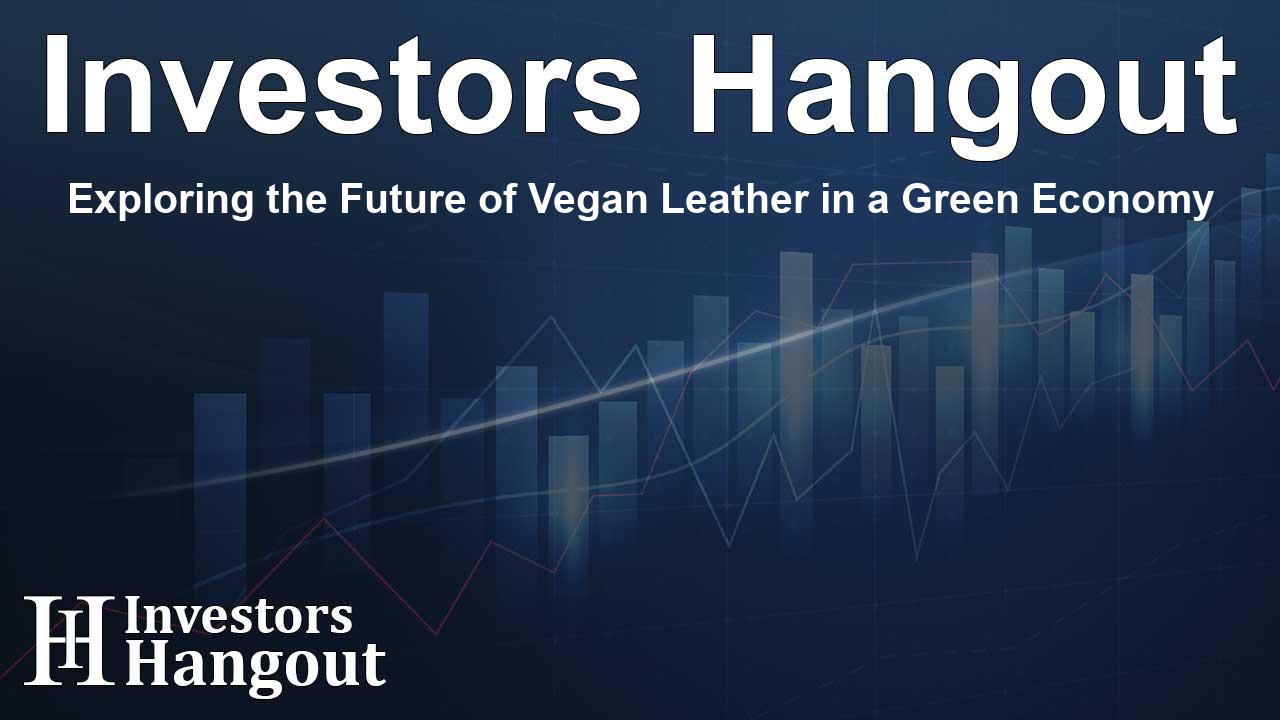Exploring the Future of Vegan Leather in a Green Economy

The Growing Vegan Leather Market: A Sustainable Perspective
Austin, TX, USA -- The surge in the vegan leather market signals a fundamental shift toward sustainability in fashion and automotive industries. According to a recent research report by Custom Market Insights, the vegan leather market is projected to expand from approximately USD 10.12 billion in 2024 to about USD 27.80 billion by 2034 at a robust compound annual growth rate (CAGR) of 10.8%. This noteworthy trend highlights a consumer shift towards cruelty-free and environmentally friendly options.
Understanding the Market Dynamics
The vegan leather segment showcases substantial growth driven by an increasing focus on sustainable production methods and eco-conscious materials. Industry leaders such as Bolt Threads, Piñatex, and Modern Meadow are pioneering the development of bio-based materials that cater to the fashion, automotive, and upholstery sectors. North America and Europe are at the forefront, embracing consumer demand for cruelty-free products amid regulatory support for sustainable practices.
Sustainable Material Innovation
Current industry trends indicate that the demand for vegan leather—crafted from materials such as pineapple fibers, mushroom mycelium, and cactus—is on the rise. These innovations stem from a combination of ethical consumerism and regulatory pressure compelling many international brands to phase out animal leather in favor of more sustainable alternatives.
Technological Advancements in Material Quality
Advancements in material science have led to innovative solutions that enhance the durability and functionality of vegan leather. Companies like MycoWorks and Bolt Threads are creating mushroom-derived leather materials that not only compete with traditional leather but also have a lower environmental impact.
Key Trends Shaping the Vegan Leather Landscape
Market analysts have identified several pivotal trends propelling the vegan leather industry forward:
- Consumer Demand for Cruelty-Free Options: The increasing awareness surrounding animal welfare is reshaping consumer preferences, favoring products that offer ethical and sustainable choices.
- Widespread Application: Vegan leather is finding applications beyond fashion, extending into automotive interiors, furnishings, and even technological accessories, significantly widening its market scope.
- E-Commerce Growth: The rise of e-commerce platforms focused on ethical branding is enhancing consumer access to vegan leather products, supported by social marketing initiatives that promote sustainability.
Regional Market Insights
The vegan leather market is divided into several regions, each contributing uniquely to global growth:
North America
North America, particularly the US and Canada, is witnessing a substantial adoption of vegan leather across various sectors. Companies in this region are actively engaging in research and development of sustainable materials, furthering the transition towards eco-friendly options in retail and automotive industries.
Europe
Europe remains a leader in the vegan leather market due to its robust regulations supporting sustainable materials. Countries like Germany and France are investing in innovative technologies that produce high-quality, plant-based leathers, subsequently meeting the increasing demand from environmentally conscious consumers.
Asia-Pacific
The Asia-Pacific region, especially nations like China and India, is experiencing significant growth driven by a burgeoning middle class and increasing awareness of sustainable practices. The demand for vegan leather is escalating as ethical consumption trends take hold, particularly in urban centers.
The Company’s Role and Future Prospects
As the market evolves, companies like Australian Oilseeds Holdings Limited (NASDAQ: COOT) hold significant potential to contribute to the sustainable materials space. Their involvement in eco-friendly practices can align with the growing consumer demand for sustainable products, cultivating a competitive edge in the market.
Frequently Asked Questions
What is the projected growth of the vegan leather market?
The market is expected to grow from approximately USD 10.12 billion in 2024 to around USD 27.80 billion by 2034, reflecting a CAGR of 10.8%.
What materials are used in the production of vegan leather?
Vegan leather can be made from a variety of materials, including polyurethane (PU), pineapple fibers, mushroom mycelium, cactus, and recycled plastics.
How is consumer demand influencing the vegan leather market?
Increasing consumer demand for cruelty-free and environmentally friendly products is driving the shift from traditional leather to vegan alternatives.
Which regions are leading in the adoption of vegan leather?
North America and Europe are leading regions in the adoption and innovation of vegan leather, while the Asia-Pacific is showing increasing demand due to rising ethical consumption trends.
What innovations are shaping the future of vegan leather?
Technological advancements in materials science, including the use of bioengineering and nanotechnology, are enhancing the durability and functionality of vegan leather.
About The Author
Contact Dylan Bailey privately here. Or send an email with ATTN: Dylan Bailey as the subject to contact@investorshangout.com.
About Investors Hangout
Investors Hangout is a leading online stock forum for financial discussion and learning, offering a wide range of free tools and resources. It draws in traders of all levels, who exchange market knowledge, investigate trading tactics, and keep an eye on industry developments in real time. Featuring financial articles, stock message boards, quotes, charts, company profiles, and live news updates. Through cooperative learning and a wealth of informational resources, it helps users from novices creating their first portfolios to experts honing their techniques. Join Investors Hangout today: https://investorshangout.com/
The content of this article is based on factual, publicly available information and does not represent legal, financial, or investment advice. Investors Hangout does not offer financial advice, and the author is not a licensed financial advisor. Consult a qualified advisor before making any financial or investment decisions based on this article. This article should not be considered advice to purchase, sell, or hold any securities or other investments. If any of the material provided here is inaccurate, please contact us for corrections.
